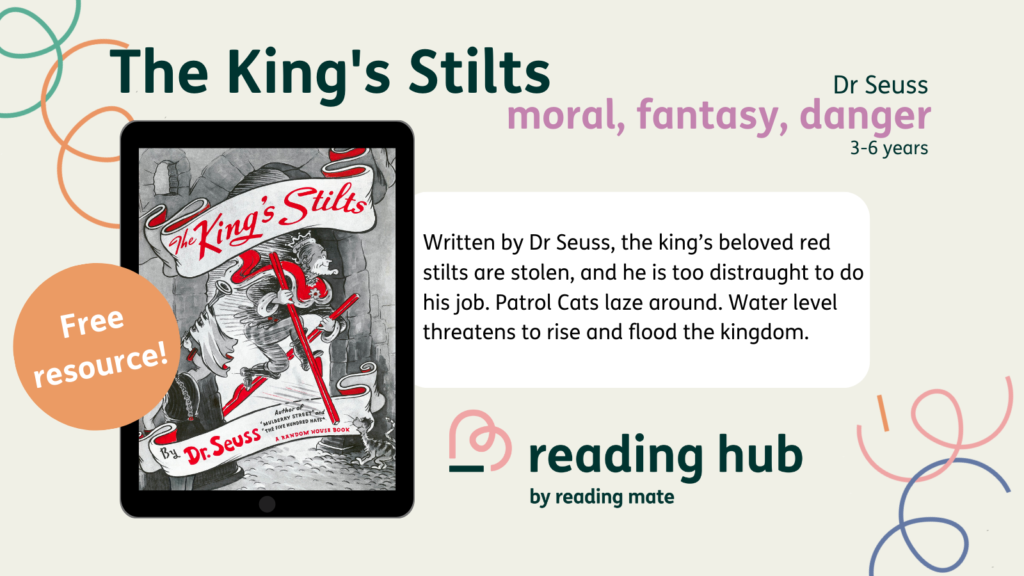Technology has advanced in leaps and bounds, and the power of reading is still undeniable. It’s a skill that can take you to new worlds, teach you about other cultures and help you grow as a person. Combining reading and technology is the way forward for learners now. So why is reading so important for children?
One reason is that books introduce children to new ideas and concepts they wouldn’t otherwise be exposed to. They can learn about history, science and other cultures in ways that are both enjoyable and educational. Reading also helps improve vocabulary, attention span and problem-solving skills.
Looking for reading activities and resources? Here’s one for EYFS pupils on Dr Suess’s The King’s Stilts.

1. The power of reading and why it’s important for children
2. How books can introduce children to new ideas and concepts
3. The benefits of reading for vocabulary, attention span and problem-solving skills
4. The importance of reading in a digital age
The power of reading and why it’s important for children
Reading is a powerful thing. It can help you learn new things and understand other people’s cultures. It also makes you smarter. That’s why it’s important for children to read, so they can grow up to be smart and successful people.
Reading strengthens our knowledge, expands our imaginations and develops our understanding unlike any other media. It also helps us become compassionate, empathetic and critical of the world around us. We all know that the power of reading is incredible, but did you know the human brain was never designed to read? It’s something that we have trained our brains to do, and it is something that we must learn. (If you’re interested in this, I’d look at Maryanne Wolf’s work into this here.)
Books introduce children to ideas and concepts that they may not have been exposed to before. Reading helps them step out of their comfort zone and explore different ways of thinking. It can help develop critical thinking skills, improve their vocabulary, and increase their attention span. Reading is also a great way for kids to learn more about the world around them since books provide a window into cultures and histories from around the globe.
Not only does reading make you smarter; it also makes your brain sharper. Studies have found that people who read regularly show improved problem-solving skills and better concentration than those who don’t read as often. This increased cognitive power can help students excel in school and beyond.
In this day and age, it’s more important than ever for kids to learn how to read. Technology is constantly advancing, and as a result, the need for strong reading skills is greater than ever. Books are still one of the best sources of knowledge and information, so learning how to read opens up a world of possibilities for children.
How books can introduce children to new ideas and concepts
Books can introduce children to new ideas and concepts in a variety of ways. For example, books can help children learn about different cultures and lifestyles. They can also provide information about historical events and interesting places around the world. In addition, books can introduce kids to new ideas about science, nature, and mathematics.
Reading helps children develop an understanding for different points of view. It allows them to explore different ways of thinking, and to consider different solutions to problems. This is an essential life skill that will serve them well in both their personal and professional lives.
Books are a valuable resource for children, and they provide many benefits that cannot be found elsewhere. By reading regularly, children can improve their vocabulary, attention span, problem-solving skills, and overall intelligence. So make sure to encourage your child to read often – it will be one of the best things you ever do for them!
So, when Stephen King said ‘books are a uniquely portable magic’ he couldn’t have been more right! But do we know why reading is so good for us?
Exercise for the brain
Reading is to the brain what a gym is to the body. It helps us sharpen our focus and memory (Kennedy, 2016), expands our vocabulary and improves our communication skills. Much like lifting weights keeps your muscles strong, reading decreases mental decline as people age.
Children who struggle to engage with reading are at greater risk of suffering from mental health conditions in their later lives (Boyes et al, 2016). Rates of anxiety, depression and stress in young people are on the rise but the good news is we can do something about it – the solution is sitting on every bookshelf, in every classroom and every library!

Making connections
Now for the science-y bit… When we read, our brain’s circuitry is developing; different areas of our brain make connections with one other and reinforce existing connections. Now imagine a child being read to, learning to read and then reading independently. All these activities are stimulating the brain and help it grow in a way that will have both mental and physical benefits.
When children read, they also connect with new characters, experience a life that isn’t their own and begin to build more social connections with the world around them. So not only are those connections happening in the brain, but they’re happening on a personal level too.
In a time when we are still feeling the impacts of prolonged periods of isolation, this is more important than ever before.
Mental wellbeing
The National Literacy Trust’s research into reading and the mental health of young people found that children who are the most engaged with literacy are three times more likely to have higher levels of mental wellbeing when compared with children who had the least level of engagement. (NLT, 2018) It’s not all doom and gloom though, reading for pleasure has been linked to lower stress levels, better sleep and higher levels of self-esteem.
When we read, we create a mental escape from the pressures of day-to-day life. Getting lost in a good book is one of the most enriching experiences we can offer children and adults alike. With just ten minutes a day children can meet the charming Paddington bear, fall down a rabbit hole in Wonderland or take a trip to Narnia. Reading about situations that aren’t their own gives children an insight into what it’s like to be someone else or be in another time.
The power of reading
Books really are uniquely portable magic. They allow our children to explore any possibility, escape the harshness of reality. More importantly, books can facilitate the development of their own emotions, morals and understanding of the world around them.
The benefits of reading for vocabulary, attention span and problem-solving skills
One of the biggest benefits of reading is that it can help you improve your vocabulary. By reading books regularly, you expose yourself to new words and phrases that you may not have heard before. This can help you expand your vocabulary and learn new ways to express yourself.
Reading can also help improve your attention span. When you’re engaged in a good book, you’re more likely to stay focused and attentive. This can be beneficial for children who are in school, as it can help them stay focused during class and improve their academic performance.
Finally, reading can also help improve problem-solving skills. When you’re faced with a difficult problem in a book, you have to think critically to find a solution. This can help train your brain to think more logically and solve problems more effectively.
The importance of reading in a digital age
With the rise of digital devices and screen time, some people may wonder if books are still important. After all, we can now watch movies and TV shows, surf the internet, play video games and read articles on our phones or laptops. So why read a book?

One reason is that books can take us to places we could never go otherwise. We can travel to other countries, explore different worlds and meet new people. Reading also helps us learn about other cultures and grow as a person.
Conclusion
As the world becomes more and more digital, it’s important to remember the power of reading. Books can take us to new places, introduce us to new ideas and concepts, and help us grow as people. In a world where screens are ubiquitous, it’s more important than ever for children to be readers. So what are you waiting for? Pick up a book today!
Would you like your learners to experience the power of reading? Reading Hub can help you!
Related articles:


